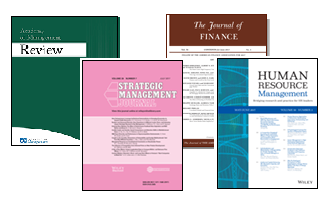So what is a ‘peer reviewed’ journal?
17/06/2015

If you are searching databases of journal articles you are likely to find that one of the ways in which you can limit your search is by restricting items retrieved to Scholarly (Peer Reviewed) journals. But if you do this, which journals are you narrowing your search to and why might you wish to do so?
The aim of peer review is to assess the quality of articles submitted for publication in a scholarly journal. Before an article can be published in a peer reviewed journal it must go through the following process:
- The manuscript is submitted by the author to the editor of the journal
- The editor then sends this to experts in the field who, because they specialise in the same area, are considered to be the author’s “peers”. In some cases the author’s identity is known to the reviewer but sometimes the articles undergo “blind peer review” which means that the author’s identity is not revealed, or even “double blind peer review”, where both the author and reviewers names are concealed.
- The reviewers must carefully ensure the quality of the manuscript. They will check for accuracy and assess the validity of the research methodology and procedures.
- If appropriate, the reviewers will suggest revisions. Once the author has undertaken any revisions the manuscript will be resubmitted and if no further revisions are requested it will be accepted. If they find the article is lacking in scholarly validity or rigour they will reject it.
Because of the rigour of this process, articles that are accepted for publication are deemed to exemplify the best practices in a research field. Peer reviewed journals therefore tend to have a high impact factor and be highly ranked.
Examples of peer reviewed journals include:
- Academy of Management Review; Journal of Marketing; California Management Review; Strategic Management Journal; Human Resource Management; MIS Quarterly; Journal of Finance.
 Many peer reviewed articles in business and management journals will follow a similar format and include:
Many peer reviewed articles in business and management journals will follow a similar format and include:

All will have an abstract and references.
You may be surprised to find that some journals which are highly thought of and frequently seen to be thought leaders are not peer reviewed! Two of the most prestigious of these are Harvard Business Review and McKinsey Quarterly.
If you have any questions about peer reviewed journals or any other aspects of your research, please do not hesitate to contact us.
Feature image from Pixabay. Available at: https://pixabay.com/photos/student-typing-keyboard-text-woman-849824/
Categories & Tags:
Leave a comment on this post:
You might also like…
Keren Tuv: My Cranfield experience studying Renewable Energy
Hello, my name is Keren, I am from London, UK, and I am studying Renewable Energy MSc. My journey to discovering Cranfield University began when I first decided to return to academia to pursue ...
3D Metal Manufacturing in space: A look into the future
David Rico Sierra, Research Fellow in Additive Manufacturing, was recently involved in an exciting project to manufacture parts using 3D printers in space. Here he reflects on his time working with Airbus in Toulouse… ...
A Legacy of Courage: From India to Britain, Three Generations Find Their Home
My story begins with my grandfather, who plucked up the courage to travel aboard at the age of 22 and start a new life in the UK. I don’t think he would have thought that ...
Cranfield to JLR: mastering mechatronics for a dream career
My name is Jerin Tom, and in 2023 I graduated from Cranfield with an MSc in Automotive Mechatronics. Originally from India, I've always been fascinated by the world of automobiles. Why Cranfield and the ...
Bringing the vision of advanced air mobility closer to reality
Experts at Cranfield University led by Professor Antonios Tsourdos, Head of the Autonomous and Cyber-Physical Systems Centre, are part of the Air Mobility Ecosystem Consortium (AMEC), which aims to demonstrate the commercial and operational ...
Using grey literature in your research: A short guide
As you research and write your thesis, you might come across, or be looking for, ‘grey literature’. This is quite simply material that is either unpublished, or published but not in a commercial form. Types ...






